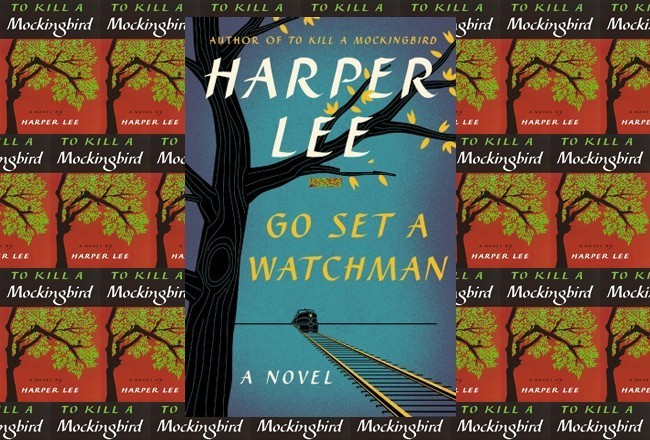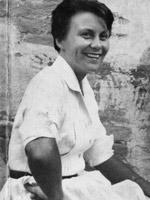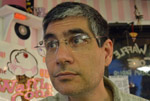
Welcome to part three of FlaglerLive’s live-blogging of “Go Set a Watchman,” the new and controversial novel by Harper Lee. We’ve invited 10 people of varied backgrounds from around the community to read the book and write their response to each of its 19 chapters, from whatever perspective they choose, at whatever length they choose, in 19 installments over the next few weeks.
For a few more details on the project, read the introduction here.
The wild read that began Sunday continues today reactions to the third chapter, which features a confrontation between Scout and her aunt that left some readers angry, others recognizing the old Scout, and still others–me among them–wondering where that Scout has gone. Jon Hardison decided to simply take out his anger on Alexandra in a letter addressed directly to her, while Smitty (can I call him Smitty? to borrow a phrase from Daniel Masbad) amplifies his reaction with a music video. The book has apparently already passed the 1 million mark in copies sold. But it’s not making too many friends here. And I very much hope that it wasn’t the last thing E.L. Doctorow had in his hands when he died today in Manhattan. More likely it was Montaigne or Chekhov. “They never fail you,” he said last year. Not many of us are finding it easy to say the same about Lee.
–Pierre Tristam
![]()

Our Ten Critics: Quick Links
- Today’s Chapter Summary
- Daniel Masbad
- Bill McGuire
- Brian McMillan
- Mary Ann Clark
- Jon Hardison
- Monica Campana
- Darrell Smitty Smith
- Jay Livingston
- Inna Hardison
- Pierre Tristam
![]()
Chapter 3 summary: The scene narrows to the relationship between Aunt Alexandra and Jean Louise, neither of whom likes the other much. Alexandra has been married three and a half decades but her husband left her for a permanent fishing hole. The chapter fills in some of the circumstances surrounding Jem’s death two years earlier, to the extent that it explains the departure of Calpurnia, the black maid, and Alexandra’s pressuring Jean Louise to move back in with her father (in his new house), though Alexandra herself did as much. Jean Louise is grateful for her to that extent. All of that leads up to the explosive part of the chapter, when Alexandra explains her disapproval of Jean Louise’s relationship with Henry: “We Finches do not marry the children of rednecked white trash, which is exactly what Henry’s parents were when they were born and were all their lives.” It gets worse. In response, Jean Louise tells her to “go pee in your hat.”
 Inna Hardison, co-owner of Ha Media and former publisher of Palm Coast Lifestyles magazine:Between shit vibrating like strings of a “spectral zither,” something I neither can nor want to imagine, the rather indelicate references to the taking of scalps, and then upping the ante to go so far as to liken poor well-corsetted auntie to Hannibal, I was pretty ready to throw the damn book through the closest’s single pane window. But alas, promises to keep (I cringed a little, writing that).
Inna Hardison, co-owner of Ha Media and former publisher of Palm Coast Lifestyles magazine:Between shit vibrating like strings of a “spectral zither,” something I neither can nor want to imagine, the rather indelicate references to the taking of scalps, and then upping the ante to go so far as to liken poor well-corsetted auntie to Hannibal, I was pretty ready to throw the damn book through the closest’s single pane window. But alas, promises to keep (I cringed a little, writing that).
I am glad the book is still intact, if only because at the very least, a few more pages into chapter 3 Harper Lee managed to make me livid, and that’s at least a reaction of some kind. Before that happened, of course, the sap in me felt just a tad of empathy for Scout at the deftly executed jab over the no-longer-with-us Jem. That little bit made me want to stick a golf club/occasional fire place poker up Aunty’s ample rear end.
In any event, “We Finches do not marry the children of rednecked white trash” conversation, if one can call it that, finally got me to feel something since this reading experiment started, and that something was rage… Rage at Lee for making it seem that Scout indeed was willing to sacrifice all but the tiniest of balls, weapons, that all but innate sense of righteousness, for a bit of inner-family propriety. Her ridiculously meek reaction to this much hatred and bigotry spewed at the man she may or may not love, but certainly likes enough, it seems, in whatever capacity left me pretty darn speechless, at least as the printable variety goes. It’s as if Jean Louise spent the last however many years trying on gloves at the various mansions South of Broad and not trudging through pee-stained uneven Manhattan streets south of 20th.
 Daniel Masbad, 2015 high school graduate (home-schooled) and concertmaster of the Flagler Youth Orchestra: How pleased I am to be free, even just for a restful bit, of the contrived, artificial colloquy that this book has submitted thus far as its idea of dialogue. How thrilled I am to make this acquaintance, to see some small fleck of a character that has the potential to be something legitimately human, though I know that I must not trust it, I must not cling too firmly nor hope too fervently that it will remain. Perhaps it is Lee’s tactic to withhold pleasure from her readers, that we may find ourselves in such ecstasy at this sprinkling of goodenough.
Daniel Masbad, 2015 high school graduate (home-schooled) and concertmaster of the Flagler Youth Orchestra: How pleased I am to be free, even just for a restful bit, of the contrived, artificial colloquy that this book has submitted thus far as its idea of dialogue. How thrilled I am to make this acquaintance, to see some small fleck of a character that has the potential to be something legitimately human, though I know that I must not trust it, I must not cling too firmly nor hope too fervently that it will remain. Perhaps it is Lee’s tactic to withhold pleasure from her readers, that we may find ourselves in such ecstasy at this sprinkling of goodenough.
At this hint of the real, I did genuinely eat up with significant fascination this characterization of Aunt Alexandra. I have an amount of respect for this type of individual equaled only by enmity on the flip side. Alexandra is the sturdy to Jean Louise’s diluted. Like Jean Louise, she probably does not operate machinery. But such a thing would not occur to this woman. She is not oppressed. She does not get bored, and she does not harm animals unless they endeavor, at their own risk, to defile her azaleas. Alexandra is technically married (a good thing at that, as she’s the last of her kind), but she has been separated from the man for fifteen years, and doesn’t seem to care a bit. The two paragraphs that follow might come close to redeeming the last twenty-some pages. Obviously, they should not be reprinted here, but, “. . . let any moral come along and she would uphold it,” resounded. Alexandra does not know the meaning of self-doubt because it was never in any textbook she read in finishing school. Now I hope that some of the first good writing was not wasted on a character who will have nothing to do with the real happenings of the book.
And then our break is over, and we once again are presented with uncomfortable, unnatural interaction. Luckily, it’s mostly fluff. We simply see that Jean Louise feels indebted to her aunt for caring for her father. Then we hear some very badly written classism: Jean Louise considers marrying Hank and mentions this to Alexandra. Alexandra responds with a hilariously inauthentic tirade, but I forgive her because she seems to be the first actual human we encounter. But here’s a question that will be on my mind from here on out: Is there anything that actually has to do with art that saw this book published?
 Bill McGuire, Palm Coast City Councilman and management consultant:As we tune in today for the continuation of “the Finches of Kornfield County” (with apologies to Hee Haw), we find Atticus still attempting to solve the riddle of buttoning his shirt, while sister Alexandra and Jean Louise skirmish with one another as to the proper behavior of a young lady in semi rural Alabama. Jean Louise discusses a possible future with Henry to the displeasure of her aunt Alexandra, who dismisses Henry as “white trash” and unworthy of a Finch. Henry arrives to escort Jean Louise out for the evening, apparently, with the approval of father Atticus.
Bill McGuire, Palm Coast City Councilman and management consultant:As we tune in today for the continuation of “the Finches of Kornfield County” (with apologies to Hee Haw), we find Atticus still attempting to solve the riddle of buttoning his shirt, while sister Alexandra and Jean Louise skirmish with one another as to the proper behavior of a young lady in semi rural Alabama. Jean Louise discusses a possible future with Henry to the displeasure of her aunt Alexandra, who dismisses Henry as “white trash” and unworthy of a Finch. Henry arrives to escort Jean Louise out for the evening, apparently, with the approval of father Atticus.
Will Jean Louise find happiness with Henry? Will Alexandra put aside her snobbish ways and is there hope for reconciliation with the husband left her, preferring to fish? Will Atticus’s character ever develop into anything other than a potted plant? For the answer to these and other burning questions tune in tomorrow as we begin Part II of this fascinating tome.
 Brian McMillan, columnist and executive editor of the Palm Coast Observer:The first few pages of chapter 3 give us the background of Alexandra Finch Hancock, as told through the snarky mind of Jean Louise. To me, this section makes the point that Alexandra is a busybody, but the point is belabored, and it makes me wonder if Harper Lee might have trimmed this section down if she had another chance at editing it.
Brian McMillan, columnist and executive editor of the Palm Coast Observer:The first few pages of chapter 3 give us the background of Alexandra Finch Hancock, as told through the snarky mind of Jean Louise. To me, this section makes the point that Alexandra is a busybody, but the point is belabored, and it makes me wonder if Harper Lee might have trimmed this section down if she had another chance at editing it.
But that raises an uncomfortable sensation for any reader: Once it’s in print, it feels somehow enshrined. These words have been written by a terrific writer, and they have been approved by a terrific editor at one of the world’s most prestigious publishing houses. Therefore, the work is perfect, right? It must be my fault if I find something imperfect in it; I must not be reading it correctly.
In this case, that mentality is further complicated by the publishing history: Harper Lee didn’t publish this book when she first wrote it, and it might not have been her decision to publish it now. Are we then as readers more justified in our critique of the craft? Should we consider this to be a draft, or a finished work?
Whatever the answer to that question, there are moments, like the redundancies in the first few pages of chapter 3, that break the spell of the novel for me. In other words I have willingly suspended my disbelief, as Coleridge advised, by reading this novel, and by so doing I have invited the writer to move me with an imaginary tale, to give my emotions a workout. But the distractions of craft make it more difficult to willingly suspend my disbelief, and I am less vulnerable as a reader; therefore, it’s a less emotionally rich experience.
Perhaps whoever is reading this, if you are also reading along in “Watchman,” will disagree with my red flags, so I’ll give a couple of examples. Alexandra is described on page 28 as a “a disapprover; she was an incurable gossip.” In the next paragraph, we learn that “she was never bored, and given the slightest chance she would exercise her royal prerogative: she would arrange, advise, caution, and warn.” Maybe I’m being picky, but I would consider those to be redundant descriptions. Are they different enough that they are serving different purposes for Harper Lee, and she is leading the reader by the hand just as she would want to? We’ll never know.
Other observations in the chapter: We have been in Jean Louise’s point of view the most in this novel so far, but page 29 is the first instance when we are so close to her brain that we get an extended interior monologue using the first person “I”: “You lie, she thought. If Atticus needed me I would know it. I can’t make you understand … ” etc. Other examples are on 30 and 31. Again, from a craft perspective, I am vacillating between 1) giving Harper Lee credit by advancing further into Jean Louise’s point of view for rhetorical effect and 2) questioning whether this is a sloppy moment when Lee is simply not being consistent in her use of point of view and 3) worried that my graduate school education has tainted me by encouraging a tendency to impose text-book craft rules on other writers who didn’t read the same text books, which exposes those text books as being not so authoritative or descriptive after all, but merely prescriptive based on some writer’s pet peeves.
The chapter concludes with a scene between Jean Louise and Atticus, and here we have other examples of Harper Lee’s deft touch and observations. When Henry arrives to pick up Jean Louise and promises to bring her home early from their date, this is how the narrator describes the old patriarch’s manner of saying goodbye: “Atticus jiggled the paper at him.” Brilliant.
 Mary Ann Clark, founder of Flagler Reads Together and president of the Flagler County Historical Society: Aunt Alexandra: Arbiter of behavior for Scout as a child and continuing in that role now that she is a 26-year old woman. She is willing to accept and admire Henry Clinton as her brother’s valued employee but not as his son-in-law. Small town folks, no matter where, have long memories and never seem to forget things better left behind. Alexandra luckily cares very much for Atticus and makes it possible for him to continue living a comfortable life. Jean Louise’s suggestion that she “go pee in her hat” was new to me; up north the expression is “crap in your hat and pull it over your ears.”
Mary Ann Clark, founder of Flagler Reads Together and president of the Flagler County Historical Society: Aunt Alexandra: Arbiter of behavior for Scout as a child and continuing in that role now that she is a 26-year old woman. She is willing to accept and admire Henry Clinton as her brother’s valued employee but not as his son-in-law. Small town folks, no matter where, have long memories and never seem to forget things better left behind. Alexandra luckily cares very much for Atticus and makes it possible for him to continue living a comfortable life. Jean Louise’s suggestion that she “go pee in her hat” was new to me; up north the expression is “crap in your hat and pull it over your ears.”
 Jon Hardison, co-owner of Ha Media in Palm Coast and member of the FlaglerLive board of directors: 40 pages into the book and for the first time I feel I’ve made a mistake. My co-readers took a moment as a preface to their comments on chapter 1 to introduce themselves. I passed on the opportunity largely because I didn’t think it mattered. The second book in this “series” (the first in our chronology) is in many ways as apple pie as it gets, managing to be the only bag that ever held a snake and a weasel at the same time with little to no incident. It touched us all where we sat and managed to walk us to a place we may or may not have wanted to go–but we went there together.
Jon Hardison, co-owner of Ha Media in Palm Coast and member of the FlaglerLive board of directors: 40 pages into the book and for the first time I feel I’ve made a mistake. My co-readers took a moment as a preface to their comments on chapter 1 to introduce themselves. I passed on the opportunity largely because I didn’t think it mattered. The second book in this “series” (the first in our chronology) is in many ways as apple pie as it gets, managing to be the only bag that ever held a snake and a weasel at the same time with little to no incident. It touched us all where we sat and managed to walk us to a place we may or may not have wanted to go–but we went there together.
This book has more than enough time and girth to redeem itself, though I don’t believe it will, and I can already feel myself (and thus my view of the book) being cleaved from the herd. So if I’m to be remotely understood from here on, it will only be for this short introduction.
Hi. I’m Jon. Nice to meet you.
I was born in the Big Apple in the early winter of ’71, to a melanin-abundant 16 year old, barely old enough to partake in the joy and splendor of the last throes of free love, aimless passion and contempt for all things daring to appear the least bit deliberate or organized. My mother would eventually climb to the status of lower middle-class, even if only barely, and the tone and reach of my life would be mapped forever, or so I was often told.
I was, unapologetically, who I was, and wise enough to know that the pictures others would paint of me would always serve them better than the truths I’d painted for myself. Our location, Chelsea, Manhattan, made inevitable a variety of friends with wide ranging backgrounds. There were kids from housing projects, Greenwich Village, the upper-east side… from the basements of who cares to the penthouses of wouldn’t you like to know. It was a fascinating environment full of amazing and terrible people, but I would have a better sample of humanity from which to fashion my person than most.
I’ll stop here, as this is the information you need to make sense of my contempt for chapter 3 and maybe even my slowly gelling contempt for this book:
Dear Alexandra:
How fucking dare you!
How dare you judge anyone by juxtaposition! How dare you presume to know the quality, content or limits of any character only by view of their blood!
It is this ill-placed belief in breeding that offends me to the core. Both, because I know it to be wrong, and because my lack thereof has been waved in my face like a disapproving finger my entire life. Even my father-in-law wouldn’t look me in the eye when I stood in his home and told him of my intentions. (Yes. I actually did that.)
An overreaction to a simple character? No, it isn’t, and here’s why:
It isn’t the utterance of the idea that bothers me. It is the cavalier acceptance of the idea by our host. Our narrator hardly raises an eyebrow when telling us of Aunty Alexandra’s secret contempt for a man she’d watched grow from nothing and should now be holding as family on several accounts. Mother Harper didn’t need to take on this role. She did so willingly–maybe forcibly. But it is her lack of outrage at the outrageous that has left me with the feeling that this person might be incapable of delivering a single word of true value to a man of my sensibilities.
 Monica Campana, just-retired head librarian at Indian Trails Middle School and free-speech advocate: This was the chapter that convinced me Harper Lee actually wrote this book. Properly corseted finishing school graduate Aunt Alexandra, who—according to Jean Louise—had gone through life at no cost to herself, comes alive with character development that only Lee could have contrived. If you have lived any time in the South (Florida doesn’t count), you have met Alexandra. You probably didn’t like her much, but then, neither does Lee. Jean Louise loves her aunt and appreciates her devotion to Atticus, but Alexandra manages to keep Jean Louise filled with guilt by “tweaking the Protestant, Philistine strings of [her] conscience until they vibrated like a spectral zither.” That is Lee’s voice, and one that could only come from a young woman raised in the pre-civil rights South. I am anxious to read about the Coffee so we can meet the young women who “remained enisled in Maycomb.” If Auntie doesn’t want Scout to marry Henry she never should have called him white trash. Drove her right into his willing arms. To cordially say with a southern drawl, “why don’t you go pee in your hat” to the next person who infuriates me is my new goal.
Monica Campana, just-retired head librarian at Indian Trails Middle School and free-speech advocate: This was the chapter that convinced me Harper Lee actually wrote this book. Properly corseted finishing school graduate Aunt Alexandra, who—according to Jean Louise—had gone through life at no cost to herself, comes alive with character development that only Lee could have contrived. If you have lived any time in the South (Florida doesn’t count), you have met Alexandra. You probably didn’t like her much, but then, neither does Lee. Jean Louise loves her aunt and appreciates her devotion to Atticus, but Alexandra manages to keep Jean Louise filled with guilt by “tweaking the Protestant, Philistine strings of [her] conscience until they vibrated like a spectral zither.” That is Lee’s voice, and one that could only come from a young woman raised in the pre-civil rights South. I am anxious to read about the Coffee so we can meet the young women who “remained enisled in Maycomb.” If Auntie doesn’t want Scout to marry Henry she never should have called him white trash. Drove her right into his willing arms. To cordially say with a southern drawl, “why don’t you go pee in your hat” to the next person who infuriates me is my new goal.
 Darrell Smitty Smith, Flagler Beach AC technician, FlaglerLive contributor and George Carlin reincarnation: Oh, my my. What a difference a chapter makes. After a passably entertaining first chapter with the excitement and promise of Jean Louse’s return home and catching up with Atticus and the folks, from the first stiff and cliched words we hit the wall like a marathon runner who lunched at Taco Bell, with the same results.
Darrell Smitty Smith, Flagler Beach AC technician, FlaglerLive contributor and George Carlin reincarnation: Oh, my my. What a difference a chapter makes. After a passably entertaining first chapter with the excitement and promise of Jean Louse’s return home and catching up with Atticus and the folks, from the first stiff and cliched words we hit the wall like a marathon runner who lunched at Taco Bell, with the same results.
Sorry about missing Chapter 2, and I’m late for Chapter three. Some of my old problems kicked in and I had to go the the VA for some attention and medication. But I don’t think it will be enough for what I got to do. And I don’t know where to go in Bunnell or the R-Section to meet new friends with enough heroin to make my promise to review the rest of this book less painful. And I as this is one of the few Bad Habits I never have had, I ain’t gonna’ do it for a damn book review. Oh, well, here goes.
Holy cow, Scout hits town and suddenly her writing skills said “Fuck this Mayberry bullshit, See Ya and call us when you get back to New York!” Reminds me of this song, which reminds me of returning home to Bridgeville, Pa., and reminds everyone I ever played it for about returning home to where they did or didn’t grow up:
Suddenly, the writing is wooden, cliched and boring. Like suddenly she is afraid to make any type of mistake. Coming home is a bitch for all of us. And Chapter 3 is no better. I’m sure that other reviewers here and elsewhere will point out each and every sophomoric faux-pas and cliche so I don’t have to. But I and I’m sure anybody who ever loved and was moved by this book is sad today.
And I myself am rapidly coming to the conclusion that Harper Lee never wrote “To Kill a Mockingbird.”
 Jay Livingston, attorney with Livingston & Sword in Palm Coast: The finch family matriarch versus the prodigal daughter. Alexandra Finch, aunt to Jean Louise and sister to Atticus, is painted as a monumental and commanding woman. Her personality as large as her rear end. The moral watchdog of the Finch family always there to render judgment and offer gossip. At first it she comes across almost as a villain. Pigheaded and confrontational she is the one person who can really get under Jean Louise’s skin. I wonder if Jean Louise loathes her Aunt and finds her intolerable. Is this our antagonist? Will she drive Jean Louise towards some climactic deed or will youth conquer age like modernity is driving out the darkness of the past on the periphery of the narrative. But it is more complicated than that. This is a chapter about family. There is love and respect between these two, who cannot help but fight when placed in the same room, but beneath the sneers and sharp tongues there eyes betray the truth of their bond.
Jay Livingston, attorney with Livingston & Sword in Palm Coast: The finch family matriarch versus the prodigal daughter. Alexandra Finch, aunt to Jean Louise and sister to Atticus, is painted as a monumental and commanding woman. Her personality as large as her rear end. The moral watchdog of the Finch family always there to render judgment and offer gossip. At first it she comes across almost as a villain. Pigheaded and confrontational she is the one person who can really get under Jean Louise’s skin. I wonder if Jean Louise loathes her Aunt and finds her intolerable. Is this our antagonist? Will she drive Jean Louise towards some climactic deed or will youth conquer age like modernity is driving out the darkness of the past on the periphery of the narrative. But it is more complicated than that. This is a chapter about family. There is love and respect between these two, who cannot help but fight when placed in the same room, but beneath the sneers and sharp tongues there eyes betray the truth of their bond.
Alexandra finch is a strong woman from the old world. The valedictorian of her finishing school and an expert on the failings of men. Married to a ghost that chooses to haunt the fishing holes of Alabama instead of tormenting his wife and child. There is an expectation that the young woman returning home from New York City to Alabama carries with her a wisdom beyond her years but when placed next to her aunt she is just a girl. As she says to Jean Louise – she is “as innocent as a new-laid egg for all your city living.” Education and worldliness are not equal substitutes for the pain and heartache of living. Beneath or tough skin and acrimony she is good. An angel not a devil. After Atticus loses his son and begins to experience the frailty of his age it is not his daughter who returns to care for him – it is Alexandra. Atticus must remind his daughter that no matter what she says or how she acts she is a good woman. I feel grateful for him that he has her.
There is an interesting choice in the names of the older generation of Finches. Scout, as many readers know her, is Jean Louise. I have to keep reminding myself that she is not a Cajun. This is Alabama not Louisiana. Her brother was Jem, which is such a wonderful southern name for a boy. But one rung up the family tree we have two individuals with such classical names: Atticus and Alexandra. The former a derivative of the province of Athens. The home of Socrates, Plato and Aristotle. The latter a feminine variation of Aristotle’s pupil from Macedonia that conquered Greece and beyond. Is Atticus wisdom and Alexandra brute force? I have no idea at this point where the book is heading (I do my best to resist the urge to read dust covers and introductions after I finish a book if I can help it) but I look forward to seeing how these two personalities fit into the story.
 Pierre Tristam, editor of FlaglerLive: The attraction of Scout as a child in “Mockingbird” was her directness, her lack of affectations, which could be abrasive but for the way the many overlapping stories and descriptive langours of the novel rounded Scout’s edges, as did the characters around her. Calpurnia was always around to slap her around if need be. Not in this Thrilla in Maycomba. The third chapter features Lee’s own narrative directness as she positions Jean Louise and Alexandra in a prophetic recreation of one of the three great Ali-Frazier fights.
Pierre Tristam, editor of FlaglerLive: The attraction of Scout as a child in “Mockingbird” was her directness, her lack of affectations, which could be abrasive but for the way the many overlapping stories and descriptive langours of the novel rounded Scout’s edges, as did the characters around her. Calpurnia was always around to slap her around if need be. Not in this Thrilla in Maycomba. The third chapter features Lee’s own narrative directness as she positions Jean Louise and Alexandra in a prophetic recreation of one of the three great Ali-Frazier fights.
The chapter begins with cartographic survey of Alexandra’s rear and goes downhill from there, though not without a few pleasant stylistic flashes. Alexandra, married for 35 years but abandoned by her husband, who was more interested in fishing (one need not wonder why), wants Jean Louise to move back in with her father though Alexandra is doing a fine job of taking care of him herself. We get a bit of narrative fill-in from two years earlier, when Jem died, though Harper Lee, in another one of those mounting editing errors, can’t decide whether Calpurnia the maid “had run off the place and not come back when she learned of Jem’s death,” or whether (not two pages later) she’d actually remained with Atticus “until six months ago.”
There’s another good bit of empty, page-filling dialogue between the two women, who dance around the ring until Lee gets to the point. By then she’s made clear that in Scout’s eyes Alexandra is insufferable, but she’s also a bigot: “Henry is not and never will be suitable for you,” she tells Scout. “We Finches do not marry the children of rednecked white trash, which is exactly what Henry’s parents were when they were born and were all their lives.” Lee breaks the cardinal rule of fiction, telling more than showing, and giving Henry hardly a chance to show his red neck for himself. Maybe that’s to come. Lee is more interested in piling on the reader’s disgust with Alexandra, who goes shock and awe on poor Henry’s ass: “Have you ever noticed how he licks his fingers when he eats cake? Trash. Have you ever seen him cough without covering his mouth? Trash. Did you know he got a girl in trouble at the University? Trash. Have you ever watched him pick at his nose when he didn’t think anybody was looking? Trash—”
With so much white-on-white hatred, who needs blacks? But it’s a reminder that the old Southern gentry or gentry-wannabe could be just as vicious to poor whites as it was to anything remotely black, and a suggestion that Lee may have intended “Watchman” to be as much about race as about class, making it that much more (potentially, because so far it hasn’t been) interesting. I may just as easily be wishfully reading into Lee’s emptier intentions.
I found Scout’s parting shot to Alexandra (“why don’t you go pee in your hat”) gratuitous more on Lee’s part than on Scout’s. It’s the sort of authorly punch line that appears to be settling an inside score rather than enriching the narrative. It makes Scout look dumber than she is, though her passivity in the face of Alexandra’s earlier barrage makes you wonder where the 6 year old who thought nothing of mashing a Cunningham’s face in the dirt has vanished.





























Oldseadog says
Yawn—I think the Chapter each day deadline is overwhelming the designated critics. I am so grateful thus
far for not purchasing the book as it is not seeming to be a classic work, but probably will make big $.
NortonSmitty says
Except for that AC repairing asshole there is better writing in these reviews than in the book.
NortonSmitty says
Oh, and I don’t think poor Harper Lee failed us, I’m pretty sure since she is about catatonic the fact she never published this ,well, whatever, for well over half a century lets us know her intentions. But I would love to have the opportunity to strangle her Agent to death with the intestines of her Attorney.